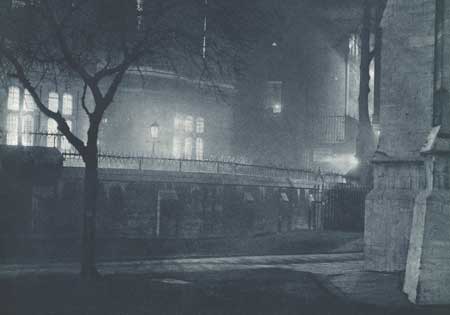Between the bridge and the two great theatres, there was but the distance of a few hundred paces, so the theatres came next. Grim and black within, at night, those great dry Wells, and lonesome to imagine, with the rows of faces faded out, the lights extinguished, and the seats all empty. One would think that nothing in them knew itself at such a time but Yorick’s skull. In one of my night walks, as the church steeples were shaking the March winds and rain with the strokes of Four, I passed the outer boundary of one of these great deserts, and entered it. With a dim lantern in my hand, I groped my well-known way to the stage and looked over the orchestra—which was like a great grave dug for a time of pestilence—into the void beyond. A dismal cavern of an immense aspect, with the chandelier gone dead like everything else, and nothing visible through mist and fog and space, but tiers of winding-sheets. The ground at my feet where, when last there, I had seen the peasantry of Naples dancing among the vines, reckless of the burning mountain which threatened to overwhelm them, was now in possession of a strong serpent of engine-hose, watchfully lying in wait for the serpent Fire, and ready to fly at it if it showed its forked tongue. A ghost of a watchman, carrying a faint corpse candle, haunted the distant upper gallery and flitted away. Retiring within the proscenium, and holding my light above my head towards the rolled-up curtain—green no more, but black as ebony—my sight lost itself in a gloomy vault, showing faint indications in it of a shipwreck of canvas and cordage. Methought I felt much as a diver might, at the bottom of the sea.
Charles Dickens, from "Night Walks"












































































































































































No comments:
Post a Comment